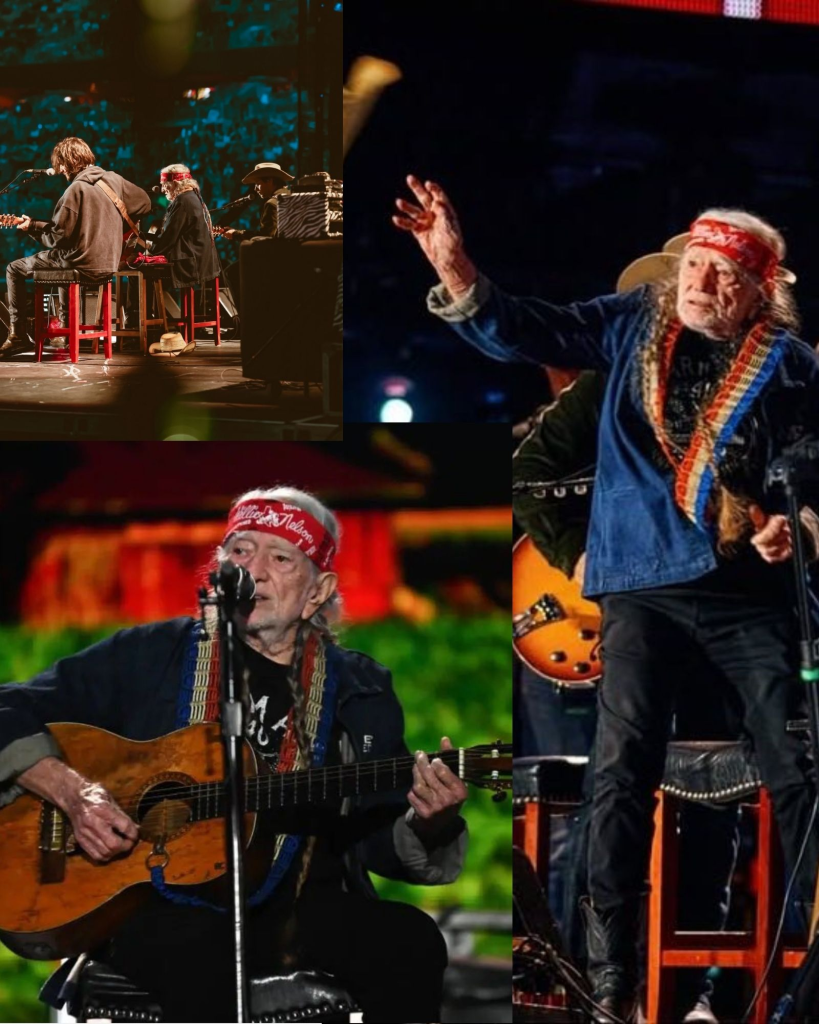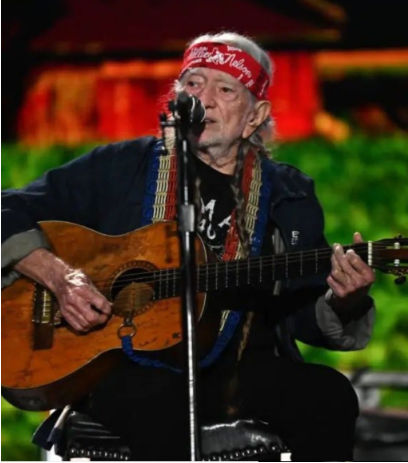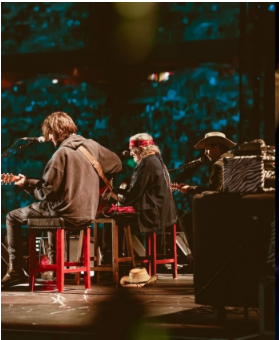In the summer of 1985, America’s heartland was in crisis. Family farms, the backbone of rural communities and a symbol of independence and hard work, were disappearing at alarming rates. Crippling debt, plunging commodity prices, and mounting foreclosures had left farmers devastated, and their stories rarely reached the national spotlight. Against this backdrop of economic despair, three musicians—Willie Nelson, John Mellencamp, and Neil Young—made a decision that would transform not only their careers but also the future of American agriculture. They founded Farm Aid, a benefit concert with a bold mission: “to keep family farmers on their land.”

Forty years later, that promise has not only endured but flourished. Farm Aid has grown into a powerful organization that blends music, advocacy, and direct support to fight for farmers’ rights, sustainability, and dignity. At the center of it all, Willie Nelson—an outlaw country icon—remains the soul of the movement, proving that music, when rooted in purpose, can change lives for generations.
The idea for Farm Aid came in part from the success of Live Aid, the global concert organized by Bob Geldof earlier in 1985 to fight famine in Africa. Watching Live Aid, Willie Nelson wondered why American farmers, facing their own desperate famine of opportunity, weren’t receiving similar attention. He reached out to Mellencamp, who grew up in Indiana farm country, and Young, who had long supported environmental and social causes. Together, they staged the first Farm Aid concert on September 22, 1985, at the University of Illinois’ Memorial Stadium in Champaign.
The lineup was staggering—Bob Dylan, Loretta Lynn, Billy Joel, Roy Orbison, and B.B. King among others. More than 80,000 fans filled the stadium, and millions more watched the broadcast. The concert raised over $9 million, but more importantly, it raised awareness. Suddenly, farmers’ struggles were part of the national conversation.
Willie Nelson, who had already been a legend in country music, took on a new role as an activist. “The fight ain’t over when the music stops,” he famously said. That mantra would define Farm Aid for decades to come.
Willie Nelson: The Heart and Soul
Willie Nelson’s leadership has been central to Farm Aid’s survival. Known for his braids, bandana, and outlaw spirit, Nelson is more than a figurehead. As Farm Aid’s President since day one, he has given the movement credibility, charisma, and continuity.
Nelson’s connection to the land is personal. Raised in Abbott, Texas, he grew up surrounded by rural life and understood firsthand the value of farming communities. His songs often reflect themes of resilience, struggle, and dignity—the very values embodied by America’s family farmers. By lending his voice, both musically and politically, Nelson transformed Farm Aid from a one-off concert into a mission.
As Neil Young once put it, “Willie is the glue. He’s the guy who keeps us coming back year after year, because he never lets us forget what’s at stake.”
From One Concert to a Movement
Over the last 40 years, Farm Aid has evolved from a benefit event into a multifaceted organization with a wide reach. Its work can be divided into three key areas:
-
- Emergency Relief – Farmers facing foreclosure, natural disasters, or unexpected crises can call the Farm Aid hotline. The organization provides direct financial assistance and connects farmers to resources that help them stay afloat. For many, these grants are the difference between losing and keeping their farms.
- Advocacy and Policy – Farm Aid has become a leading voice in shaping agricultural policy. The organization has lobbied for fair prices, fought against corporate consolidation, and pushed for legislation that supports sustainable farming practices. Its presence on Capitol Hill ensures that farmers’ voices are not drowned out by powerful agribusiness interests.
- Education and Awareness – Beyond concerts, Farm Aid promotes sustainable agriculture and local food systems. Through its “Homegrown Village” at concert venues, the organization educates fans about the benefits of family farms, organic practices, and farm-to-table connections.
In short, Farm Aid has matured into an ecosystem of support, proving that a promise made in 1985 could adapt to new challenges without losing its core mission.

Four Decades of Music and Mission
Every year since its founding, Farm Aid has staged a concert somewhere in the United States. The roster has featured a who’s who of American music: Dave Matthews, Sheryl Crow, Bonnie Raitt, Chris Stapleton, and even newer acts like Sturgill Simpson. Each artist performs not only to entertain but to stand in solidarity with farmers.
The concerts themselves are unique. Unlike typical festivals, Farm Aid blends performances with testimonies from farmers. Between sets, audiences hear real stories about debt, resilience, and the fight to preserve family land. The result is a reminder that Farm Aid isn’t just about music; it’s about people whose daily work puts food on the nation’s tables.
In 2020, when the COVID-19 pandemic forced the cancellation of live gatherings, Farm Aid pivoted quickly to a virtual concert. This move not only raised money but also showcased the adaptability of an organization built to weather storms.
The Changing Face of Farming
When Farm Aid began, the crisis was primarily about family farm foreclosures. While that issue remains, new challenges have emerged. Climate change has brought floods, droughts, and wildfires. Corporate consolidation has squeezed small farmers out of markets. Global trade policies have left American farmers vulnerable to price swings.
At the same time, new opportunities have arisen. Organic farming, local food movements, and regenerative agriculture have gained momentum. Younger generations are showing renewed interest in farming, but they need support to overcome barriers to land ownership and financing.
Farm Aid has positioned itself at the center of these shifts, advocating not only for survival but for innovation. It champions farmers who use sustainable practices, reduce carbon footprints, and strengthen local food economies. In this way, Farm Aid is not just preserving the past—it is shaping the future.
A Promise Kept
Looking back, the longevity of Farm Aid is remarkable. Many benefit concerts have come and gone, but few have sustained their relevance for four decades. The key has been consistency: the promise made in 1985 has never wavered.
Willie Nelson’s steadfast presence, combined with the dedication of Mellencamp, Young, and newer board members like Dave Matthews, has given Farm Aid both tradition and renewal. Together, they have ensured that farmers are not forgotten, that their struggles remain visible, and that their victories are celebrated.
In an America where food is often taken for granted, Farm Aid serves as a reminder of the human effort behind every meal. It insists that family farmers are not relics of the past but essential stewards of the land and community.
The Next 40 Years

As Farm Aid enters its fifth decade, its work is more vital than ever. Climate change threatens to reshape agriculture in profound ways, while economic inequality continues to widen. The promise to “keep family farmers on their land” must now encompass not only survival but sustainability, resilience, and justice.
Willie Nelson, now in his nineties, remains the guiding light. His health and age inevitably raise questions about the future of Farm Aid, but the organization he helped build is strong enough to endure. Younger artists and activists are stepping forward, ready to carry the torch.
What began in Illinois in 1985 as a desperate response to crisis has become a cultural institution, a lifeline, and a moral compass. Farm Aid’s story is not just about music or agriculture; it is about promises—how they are made, kept, and passed on.
Conclusion
Forty years after Willie Nelson, John Mellencamp, and Neil Young first stood on a stage to fight for America’s farmers, Farm Aid is still here, still singing, still standing. It has distributed millions of dollars in aid, influenced policy, and raised generations of awareness. More importantly, it has kept its word to those who feed the nation.
In a world where movements often fade, Farm Aid is proof that commitment, when rooted in justice and nurtured by music, can endure across decades. As long as there are farmers who need a voice, and as long as Willie Nelson’s spirit lives on in its mission, Farm Aid’s promise will remain unbroken—a 40-year promise that still echoes in every note, every field, and every harvest.





